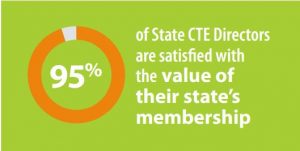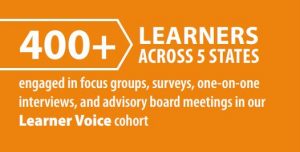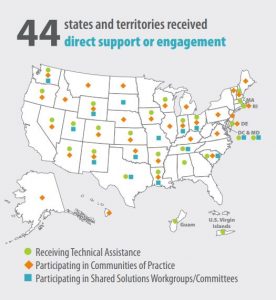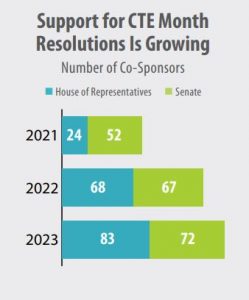This week, the U.S. Department of Education (ED) announced that it would extend the deadline for one of the components of a recent regulatory proposal impacting the implementation of the Carl D. Perkins Career and Technical Education Act (Perkins V) in response to a formal request made by Advance CTE and partners. Elsewhere, Congress has remained on recess ahead of the upcoming November elections while the U.S. Department of Labor (DOL) makes preparations for National Apprenticeship Week and announces new grant opportunities.
ED Modifies Comment Deadline for Perkins V ICR
 This morning, the U.S. Department of Education (ED) announced that it would extend the public comment period for a recently proposed Information Collection Request (ICR) with significant implications for the implementation of Perkins V. The two-week comment period extension will apply to feedback responses to proposed changes to Perkins V’s Consolidated Annual Report (CAR) while the existing deadline for comments related to the State Plan Guide component of this ICR remain unchanged and are still due November 12, 2024. This announcement comes in response to Advance CTE and the Association for Career and Technical Education’s (ACTE) formal request for an extension made in recent weeks. In addition, ED’s Office of Career, Technical, and Adult Education (OCTAE) hosted two town halls last week, providing further details regarding these proposed ICRs. Notably, ED confirmed during these events that every state and territory would be required to undergo a new comprehensive planning process required by Perkins V regardless of whether a state submits a new or amended state plan by program year 2026.
This morning, the U.S. Department of Education (ED) announced that it would extend the public comment period for a recently proposed Information Collection Request (ICR) with significant implications for the implementation of Perkins V. The two-week comment period extension will apply to feedback responses to proposed changes to Perkins V’s Consolidated Annual Report (CAR) while the existing deadline for comments related to the State Plan Guide component of this ICR remain unchanged and are still due November 12, 2024. This announcement comes in response to Advance CTE and the Association for Career and Technical Education’s (ACTE) formal request for an extension made in recent weeks. In addition, ED’s Office of Career, Technical, and Adult Education (OCTAE) hosted two town halls last week, providing further details regarding these proposed ICRs. Notably, ED confirmed during these events that every state and territory would be required to undergo a new comprehensive planning process required by Perkins V regardless of whether a state submits a new or amended state plan by program year 2026.
Congress Remains on Recess Amid Storm Damage
Capitol Hill remains in recess this week as the November elections draw closer. Over the last few weeks, severe storms have significantly impacted several states. Due to these circumstances, there has been increasing pressure for Congress to potentially reconvene, prior to the upcoming elections, to provide supplemental emergency funding for states impacted by these weather events. A bipartisan group of Senators recently sent a letter highlighting this need, and similar efforts are underway in the House.
Despite this mounting pressure, Speaker Mike Johnson (R-LA) has thus far resisted calls to reconvene. The need to provide funding in response to these latest hurricanes is widely expected to impact future negotiations for long-term funding for federal programs, like Perkins V’s state grant program, for the current 2025 federal fiscal year (FY25). As a reminder, current funding—recently extended by a continuing resolution (CR) passed by Congress late last month—is set to expire on December 20, 2024. Advance CTE will continue to advocate for a robust investment in CTE via Perkins V as the FY25 process progresses.
Department of Labor Continued Federal Support for Apprenticeship Programs
This week, the Department of Labor shared details for the 10th annual National Apprenticeship Week (NAW), a week dedicated to celebrating 10 Years of Engagement, Expansion, and Innovation of impacting lives through apprenticeship programs. Spanning the week of November 17th through 23rd, the 2024 celebration features daily themes with ways to get involved listed on Labor’s NAW Fact Sheet. Advance CTE looks forward to celebrating Career Technical Education’s critical role and connection to apprenticeships later this fall.
DOL also shared a list of resources for outreach to businesses to support apprenticeship investment and implementation. A related list has links to federal, state, and industry-specific resources for outreach anywhere on the continuum of strategic partnership. The Department also conducted a series of Industry Focus Calls throughout the summer to support state grantees in expanding Registered Apprenticeship Programs (RAPs) to meet employers’ needs. The 2024 calls shared best practices and successes for launching RAPs in education, the public sector, green energy, and mental and behavioral healthcare. The calls and resources dating back to 2019 can be accessed here.
Earlier this fall, the Biden-Harris administration issued an executive order related to Investing in America and Investing in American Workers that highlights the importance of prioritizing federally funded projects that prioritize workforce development efforts, including the availability of career pathways and RAPs.
Department of Labor Grants Available for Work-Based Learning for Underserved Youth
The Department of Labor announced a fifth round of Workforce Pathways for Youth grants, authorized under the Workforce Innovation and Opportunity Act (WIOA), available for out-of-school organizations that engage underserved youth ages 14 to 21. The grants are intended to help organizations introduce career-related services, work-based learning opportunities, and occupational skills training. Applications are open until December 3rd, 2024, and eligibility requirements are listed on the application page. Read more about Workforce Pathways for Youth, previous program recipients, and other resources here.
Rob Young, Communications & Advocacy Associate
Steve Voytek, Policy Advisor


 resources for community colleges to develop and provide robust training opportunities for learners. Applications for this funding are due September 24, 2024. Advance CTE is strongly supportive of the SCCTG program and is currently advocating for its codification in WIOA as discussions continue regarding reauthorization of this legislation.
resources for community colleges to develop and provide robust training opportunities for learners. Applications for this funding are due September 24, 2024. Advance CTE is strongly supportive of the SCCTG program and is currently advocating for its codification in WIOA as discussions continue regarding reauthorization of this legislation.  Lawmakers Include Focus on Appropriations and WIOA in Next Work Period
Lawmakers Include Focus on Appropriations and WIOA in Next Work Period 
 CTE leadership and workforce pipelines, and elevating learner voice. Our members continue to see value in their membership and look for a variety of ways to engage.
CTE leadership and workforce pipelines, and elevating learner voice. Our members continue to see value in their membership and look for a variety of ways to engage. Bringing together our members in person and virtually provides the opportunity to share best practices and lessons learned to address common challenges and improve outcomes for CTE learners. In Spring of 2023 we gathered over 200 CTE leaders to discuss opportunities, challenges, and shared solutions around various topics of the Carl D. Perkins Career and Technical Education Act (Perkins V) in preparation for state plan revisions. Our members were very satisfied with the structure of these meetings, finding it a very useful space to work with their state teams on Perkins processes and gather ideas from their peers. In event evaluation, 100 percent of responding attendees reported that meetings were an “extremely valuable” or “valuable” use of their time.
Bringing together our members in person and virtually provides the opportunity to share best practices and lessons learned to address common challenges and improve outcomes for CTE learners. In Spring of 2023 we gathered over 200 CTE leaders to discuss opportunities, challenges, and shared solutions around various topics of the Carl D. Perkins Career and Technical Education Act (Perkins V) in preparation for state plan revisions. Our members were very satisfied with the structure of these meetings, finding it a very useful space to work with their state teams on Perkins processes and gather ideas from their peers. In event evaluation, 100 percent of responding attendees reported that meetings were an “extremely valuable” or “valuable” use of their time. 

 Hello! My name is Jessica (Jessi) Maddox, and I am ecstatic to be a part of the Advance CTE team as a senior policy associate. In this role I will be working directly with the upcoming cohorts of the Opportunity Gap Analysis providing customized technical assistance and peer learning opportunities to participating states. I will also collaborate with team members to enhance Advance CTE’s state policy, equity, and data and research strategies by supporting state and local sites in designing and advancing high-quality and equitable career pathways.
Hello! My name is Jessica (Jessi) Maddox, and I am ecstatic to be a part of the Advance CTE team as a senior policy associate. In this role I will be working directly with the upcoming cohorts of the Opportunity Gap Analysis providing customized technical assistance and peer learning opportunities to participating states. I will also collaborate with team members to enhance Advance CTE’s state policy, equity, and data and research strategies by supporting state and local sites in designing and advancing high-quality and equitable career pathways.